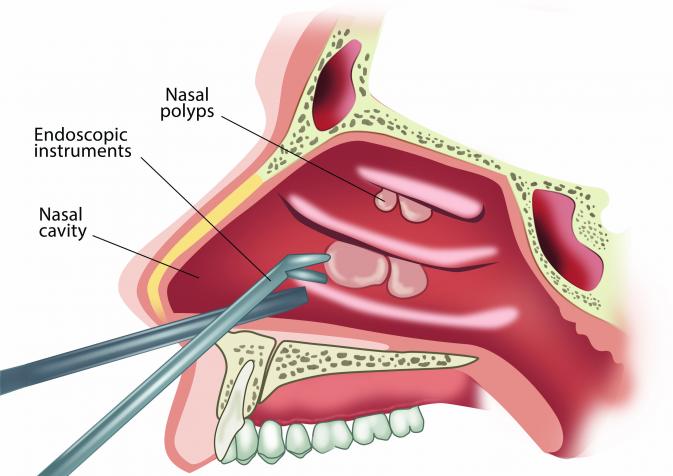Nasal polyps are multiple, greyish grape-like structures that occur inside the nose and cause nose block. They are suspected to occur as a result of nasal allergy.

What are the symptoms of nasal polyps?
The symptoms of nasal polyps are severe nose block, which is usually bilateral. The patient may also have watery nasal discharge, watering from the eye, excessive sneezing and other symptoms of allergy. Rarely, the nasal polyp may get infected. In such circumstances, the patient may additionally have minimal bleeding from the nose and pain.
Nasal Polyps Treatment?
The first line of treatment for nasal polyps is medical. It includes a short course of oral steroids, to reduce the size of the polyps. Long-term use of steroid nasal spray to prevent an increase in size and recurrence. The last resort for extensive nasal polyposis, that is not responding to the medical line of management is the Endoscopic removal of polyps.
What is Nasal Polyps Surgery?
It is a procedure done under general anesthesia and requires 1-2 days of admission. No incision is made on the nose or the face. The polyps are visualised using an endoscope (A thin long torch) and removed with the help of an instrument called a microdebrider. This instrument avoids injury to the normal surrounding tissue and causes very minimal bleeding.
What is the recovery like after nasal polyps surgery?
The nose will be packed for 1-2 days post-surgery to prevent any subsequent bleeding. While the nose is packed there will be minimal nose block, blood-stained nasal discharge, watering from the eyes and minimal headache. The patient should get endoscopic cleaning of the nose on days 7, 14 and 21 after surgery, to remove any crusts formed.
Post-operative care also includes douching the nose at home, by the patient with saline mixed with respules of steroids for 1-2 months. This is done to prevent the recurrence of polyps.
However many precautions are taken by the doctor and the patient, one should understand that nasal polyposis is a highly recurrent condition. It can be brought under control by medications and sometimes surgery. However, eliminating it is very difficult.



